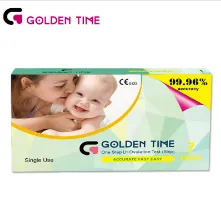నవం . 21, 2024 14:49 Back to list
An In-Depth Guide to Fertility Tests
Fertility tests play a crucial role in understanding reproductive health for both men and women. With various test options available, including affordable home test kits, these tools provide valuable insights into fertility status and help in planning for conception. This article will guide you through the basics of fertility tests, the different types available, and what to expect in terms of pricing.

What is a Fertility Test?
A fertility test is a diagnostic tool designed to assess an individual’s ability to conceive. For women, fertility testing commonly evaluates factors like hormone levels, ovarian reserves, and ovulation regularity, while men’s fertility tests focus on sperm quality, count, and motility.
Types of సంతానోత్పత్తి పరీక్షలు
Ovulation Test Kits: Often available over-the-counter, these kits measure luteinizing hormone (LH) levels to predict ovulation. As LH surges, it indicates that ovulation is likely within 24-48 hours, which is the best time for conception.
At-Home Fertility Test Kits: There are fertility test kits for both men and women, typically assessing hormone levels through blood or saliva samples. Some popular at-home kits can measure Anti-Müllerian Hormone (AMH) levels in women, which indicates the ovarian reserve, while male fertility kits generally evaluate sperm count and motility.
Blood Tests: These tests are done in a clinic and assess hormones like Follicle-Stimulating Hormone (FSH), LH, and progesterone levels, as well as thyroid levels, which can affect fertility. For men, blood tests often include testosterone levels and additional semen analysis.
Imaging Tests: Ultrasounds or X-rays help visualize the reproductive organs. In women, ultrasounds check the uterus and ovaries, while a hysterosalpingogram (HSG) X-ray checks for blockages in the fallopian tubes.
Specialized Tests: Depending on the initial results, doctors may order tests like genetic screening, endometrial biopsies, or laparoscopy to get a comprehensive view of one’s fertility status.
Benefits of Using an At-Home Fertility Test Kit
Fertility test kits have made it possible to gain preliminary fertility insights conveniently and privately. Here are some of the benefits:
- Convenience: No need to schedule appointments or travel to clinics.
- Affordability: At-home test kits are generally less expensive than clinical tests, making them accessible to more individuals.
- Privacy: Testing at home offers privacy, which can be more comfortable for some people.
How to Use a Fertility Test Kit
- Follow Instructions Carefully: Each kit includes instructions on sample collection. Some tests require a blood drop from a finger prick, while others may need a saliva or urine sample.
- Take the Test at the Right Time: Timing is crucial for accurate results. For example, ovulation kits should be used around the middle of a woman’s menstrual cycle.
- Send the Sample for Analysis: Many kits provide prepaid packaging for mailing the sample to a lab. Results are usually available online within a few days.
What to Consider When Buying a Fertility Test Kit
- Types of Tests Offered: Check if the kit covers the aspects of fertility you’re interested in—such as hormone levels or ovulation prediction.
- ధర: Fertility test pricesvary widely depending on the type of test. While basic ovulation predictor kits are inexpensive, comprehensive at-home hormone tests may cost more.
- Accuracy and Reliability: Opt for reputable brands with good reviews. Clinical validation can ensure more reliable results.
Fertility Test Prices and Options
The fertility test price can range from $10 to $50 for basic ovulation test kits, while full hormone testing kits typically cost between $50 and $200. Prices for advanced fertility test kits that measure multiple hormones or assess egg quality may be higher. For in-clinic testing, prices can range from $100 for a single hormone test to several hundred dollars for full fertility panels.
How to Find a Cheap Fertility Test
For those looking for cheap fertility test options, ovulation test strips are a budget-friendly choice. These tests indicate the best time to conceive by identifying the LH surge. Additionally, there are promotional discounts and online sales from manufacturers or pharmacies that make more comprehensive test kits affordable.
When to Seek Further Testing
If initial results from an at-home fertility test suggest potential issues, or if conception has not occurred after 6-12 months of trying (or sooner for those over 35), further clinical fertility testing may be recommended. Consulting with a fertility specialist allows for a detailed analysis and personalized treatment plan, which may include more advanced diagnostic tests or assisted reproductive treatments.
Fertility testing has become accessible and convenient, with various options catering to different needs and budgets. From at-home fertility test kits for early insight to advanced clinical testing, understanding one’s fertility has never been more achievable. By exploring these options, you can take informed steps on your path to parenthood, whether starting with a cheap fertility test or opting for a comprehensive assessment.
-
The Benefits of Rapid Vet Test Kits
వార్తలుJun.26,2025
-
LH Strip Test Accuracy
వార్తలుJun.26,2025
-
Importance of Ovulation Prediction Test Kits
వార్తలుJun.26,2025
-
How Midstream Pregnancy Tests Work
వార్తలుJun.26,2025
-
Hbsag Rapid Test Procedure
వార్తలుJun.26,2025
-
Canine Parvo Test Kit Accuracy
వార్తలుJun.26,2025

